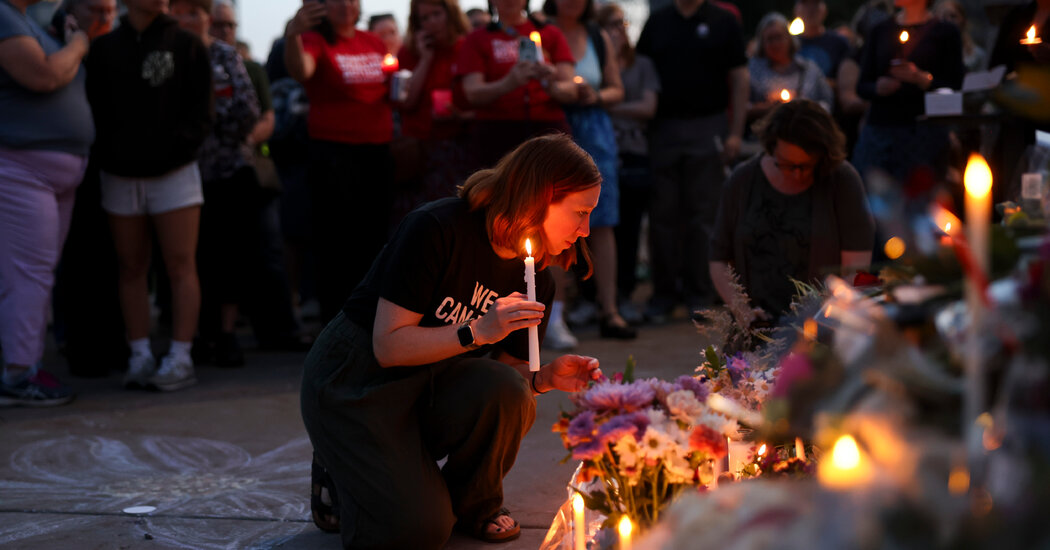Minnesotans awoke on a recent Saturday to reports that an assassin had spent the night ticking his way down a list of Democratic targets, wounding one state lawmaker and his wife and then, just as the police closed in, killing another, along with her husband and their dog.
It was shocking. But it quickly seemed to become just another episode in a recent spate of political violence. Since last July, two people have tried to assassinate Donald J. Trump, an arsonist set fire to the Pennsylvania governor’s mansion while the family slept, an assailant fatally shot a couple leaving the Capital Jewish Museum in Washington and a man was charged with attempting to kidnap the mayor of Memphis.
The result is a troubling sense that political violence has become more brazen, and its motives more difficult to comprehend. The increase is not just public perception; experts agree that attacks on political figures have been increasing.
The Armed Conflict Location & Event Data project, a nonprofit that tracks conflicts around the globe, has recorded 21 acts of violence against politicians, their families or their staffs in the United States since it began counting them in 2020. A vast majority have occurred since 2022.
The rise comes as vicious and dehumanizing language and images become common in American politics. Online culture is a potent vector, seeming to only amplify rather than calm or contextualize, while offering plenty of encouragement to would-be imitators. And guns have been deregulated in many states, becoming easier to acquire.
Political violence can encompass a broad range of actions, from torching Tesla charging stations to premeditated sniper attacks, making it difficult to quantify.
And violence motivated by racial, ethnic and partisan differences has been part of the American story line from the beginning. Those annals include the terror campaigns of the Ku Klux Klan, the anarchist bombing of Wall Street in 1920 and the gunning down of police officers by the Black Liberation Army in the ’70s — all violence that had societal or even revolutionary aims.
In contrast, American political violence today is more likely to be carried out by someone acting alone, in despair and deeply dosed on the steroidal forms of extremism offered by the internet.
Such attacks can seem infused with futility from the outset, said Shuki Cohen, who studies terrorism and political violence at the John Jay College of Criminal Justice. The new ideology is nihilism itself, he said, “just a vague doomsday mentality of burn it all down and go out in a blaze of glory.”
Perpetrators exhibit “learned helplessness,” he said, a sense that the political system is incapable of averting the jumble of apocalyptic scenarios cited in their manifestoes: climate change, unregulated artificial intelligence, concentrated wealth, nuclear threat and society’s moral collapse.
Sometimes it is possible to draw a straight line between ideology and action. Vance Boelter, the man accused in the Minnesota attacks, was a conservative Christian who opposed abortion and targeted liberals. Luigi Mangione, accused in the shooting of a health insurance executive on a Manhattan street last year, was a critic of the American health care system. And there’s Guy Edward Bartkus, who officials say detonated a bomb outside a fertility clinic in Palm Springs, Calif., in May, in the apparent belief that humans should voluntarily become extinct.
But the motive of Thomas Crooks, charged with the attempted assassination of Mr. Trump at a campaign rally in Butler, Pa., last July, was a riddle. He had done internet searches for both Mr. Trump and Joseph R. Biden Jr., seeming to have chosen his target almost at random. He had no “definitive ideology,” the F.B.I. concluded, but he did have an AR-15-style rifle. Does that count as political violence, or just American violence?
“Those sorts of incidents, where we can’t figure out why they did it, are becoming more common,” said Katherine Keneally, the director of threat analysis and prevention at the Institute for Strategic Dialogue, a nonprofit that works to combat extremism.
Of course, America’s legacy of political violence is littered with all manner of motives. John Wilkes Booth was part of an organized conspiracy that opposed President Abraham Lincoln’s views, but the killer of President James A. Garfield, less than 20 years later, became a landmark case for the insanity defense, said Adam Goodheart, the director of the Starr Center for the Study of the American Experience at Washington College.
Sirhan Sirhan said he killed Senator Robert F. Kennedy to block him from aiding Israel against Palestinians if he were elected president. John Hinckley Jr., on the other hand, tried to assassinate President Ronald Reagan to impress the actress Jodie Foster.
“Almost every president of the past century has been the target of a serious assassination attempt,” Mr. Goodheart said.
The United States has long glamorized violence. It has a higher homicide rate than other developed Western nations, and mass shootings have become routine. Recently, threats against public officials have soared. The number investigated each year by the Capitol Police, who protect federal lawmakers, has more than doubled, rising to 9,474 last year from 3,939 in 2017. Threats against judges have spiked dramatically since Mr. Trump returned to office, according to data from the U.S. Marshals Service.
On the other hand, experts say the threat of violence by right-wing extremist groups, which have long been behind most domestic terror attacks, began to recede before Mr. Trump won the election, in part because their leaders were prosecuted after the Jan. 6 invasion of the Capitol, and in part because of expectations that Mr. Trump would win.
“In some periods, you don’t need political violence,” said Dan Byman, the director of the Warfare, Irregular Threats, and Terrorism Program at the Center for Strategic and International Studies. “The Klan, strangely enough, was weaker in Mississippi in the ’60s than it was in North Carolina. Which might seem odd, but the reason is if you were racist, the government of Mississippi was doing exactly what you wanted.”
At times, political violence is intended to accelerate social change, like the abolitionist John Brown’s raid on Harpers Ferry, spurred by a belief that the antislavery movement wasn’t radical enough.
Other times, it is a reactionary attempt to stave off the future. The Civil War, Mr. Goodheart said, could be thought of as “a massive act of extralegal political violence that killed three-quarters of a million Americans.”
More recently, experts like Robert Pape, a political scientist at the University of Chicago, have suggested that the current turbulence is related to America’s demographic transformation into a country where white people are the minority and to the increasing concentration of wealth in the hands of a few. Right-wing provocateurs have played on that fear with conspiracy theories like the Great Replacement, which suggests that liberal elites are encouraging immigration to bolster their political power.
Where once extremist content was shared in print magazines or books, and people had to pass initiation rites to join groups like the Klan, social media has removed barriers to even the most violent fantasies, offering anonymity and specialized echo chambers for ever more baroque grievances.
Everything now is amplified, including word of political violence when it happens. In the past, such acts could be obscured. Digging through a clergyman’s diary, Mr. Goodheart recently came across what may be the only surviving account of violent conflicts in Chestertown, Md., in the 1860s, over the exclusion of Black people from religious gatherings.
“Today, of course, it would be all over social media if there were an armed clash between whites and African Americans in an American town,” he said. “But at the time, it made barely a ripple.”
Shaila Dewan covers criminal justice — policing, courts and prisons — across the country. She has been a journalist for 25 years.
The post Political Violence Is Part of the American Story. It Is Also Changing. appeared first on New York Times.




